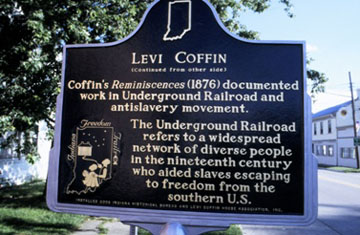

Location: 113 US 27 North, Fountain City. (Wayne County, Indiana)
Installed: 2002 Indiana Historical Bureau and Levi Coffin House Association, Inc.
ID# : 89.2002.1
Text
Side one:
Levi Coffin (1798-1877), a Quaker abolitionist, lived in Newport (now Fountain City) with his family 1826-1847. Moved from North Carolina because he and his wife, Catharine, opposed slavery. Advocated, and sold in his store, free-labor products not produced by slaves. House built circa 1839; designated a National Historic Landmark 1966.
Side two:
Coffin's Reminiscences (1876) documented work in Underground Railroad and antislavery movement. The Underground Railroad refers to a widespread network of diverse people in the nineteenth century who aided slaves escaping to freedom from the southern U.S.
Keywords
Underground Railroad, African American
Annotated Text
Side one:
Levi Coffin (1798-1877), (1) a Quaker abolitionist, lived in Newport (now Fountain City) with his family 1826- 1847.(2) Moved from North Carolina because he and his wife, Catharine, opposed slavery.(3) Advocated, and sold in his store, free-labor products not produced by slaves.(4) House built circa 1839;(5) designated a National Historic Landmark 1966.(6)
Side two:
Coffin's Reminiscences (1876) documented work in Underground Railroad and antislavery movement. The Underground Railroad refers to a widespread network of diverse people in the nineteenth century who aided slaves escaping to freedom from the southern U.S.
1) National Underground Railroad Freedom Center, at "Levi Coffin: President of the Underground Railroad, " Indiana Historical Society, accessed March 7, 2001; "Funeral of Levi Coffin," Wednesday evening, September 19, 1877, Cincinnati Daily Times Star.
2))"Levi Coffin, " Indiana Historical Society; Levi Coffin, Reminiscences of Levi Coffin: The Reputed President of the Underground Railroad (New York: Arno Press, 1968), 105.
3) L. Coffin, Reminiscences, p. 11, 106.
4) Ibid., p. 106-107, 265-275.
5) National Register of Historic Places Inventory - Nomination Form, 1977.
6) Historic Indiana: Indiana Properties Listed in the National Register, 2003-2004 (Indianapolis, 2004), p. 52.
